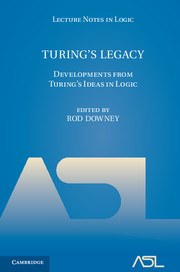Book contents
- Frontmatter
- Contents
- Turing's legacy: developments from Turing's ideas in logic
- Computability and analysis: the legacy of Alan Turing
- Alan Turing and the other theory of computation (expanded)
- Turing in Quantumland
- Computability theory, algorithmic randomness and Turing's anticipation
- Computable model theory
- Towards common-sense reasoning via conditional simulation: legacies of Turing in Artificial Intelligence
- Mathematics in the age of the Turing machine
- Turing and the development of computational complexity
- Turing machines to word problems
- Musings on Turing's Thesis
- Higher generalizations of the Turing Model
- Step by recursive step: Church's analysis of effective calculability
- Turing and the discovery of computability
- Transfinite machine models
- References
Step by recursive step: Church's analysis of effective calculability
Published online by Cambridge University Press: 05 June 2014
- Frontmatter
- Contents
- Turing's legacy: developments from Turing's ideas in logic
- Computability and analysis: the legacy of Alan Turing
- Alan Turing and the other theory of computation (expanded)
- Turing in Quantumland
- Computability theory, algorithmic randomness and Turing's anticipation
- Computable model theory
- Towards common-sense reasoning via conditional simulation: legacies of Turing in Artificial Intelligence
- Mathematics in the age of the Turing machine
- Turing and the development of computational complexity
- Turing machines to word problems
- Musings on Turing's Thesis
- Higher generalizations of the Turing Model
- Step by recursive step: Church's analysis of effective calculability
- Turing and the discovery of computability
- Transfinite machine models
- References
Summary
In fact, the only evidence for the freedom from contradiction of Principia Mathematica is the empirical evidence arising from the fact that the system has been in use for some time, many of its consequences have been drawn, and no one has found a contradiction.
(Church in a letter to Godel, July 27, 1932)Abstract. Alonzo Church's mathematical work on computability and undecidability is well known indeed, and we seem to have an excellent understanding of the context in which it arose. The approach Church took to the underlying conceptual issues, by contrast, is less well understood. Why, for example, was “Church's Thesis” put forward publicly only in April 1935, when it had been formulated already in February/March 1934? Why did Church choose to formulate it then in terms of Gödel's general recursiveness, not his own λ-definability as he had done in 1934? A number of letters were exchanged between Church and Paul Bernays during the period from December 1934 to August 1937; they throw light on critical developments in Princeton during that period and reveal novel aspects of Church's distinctive contribution to the analysis of the informal notion of effective calculability. In particular, they allow me to give informed, though still tentative answers to the questions I raised; the character of my answers is reflected by an alternative title for this paper, Why Church needed Gödel's Recursiveness for his Thesis.
Information
- Type
- Chapter
- Information
- Turing's LegacyDevelopments from Turing's Ideas in Logic, pp. 434 - 466Publisher: Cambridge University PressPrint publication year: 2014
